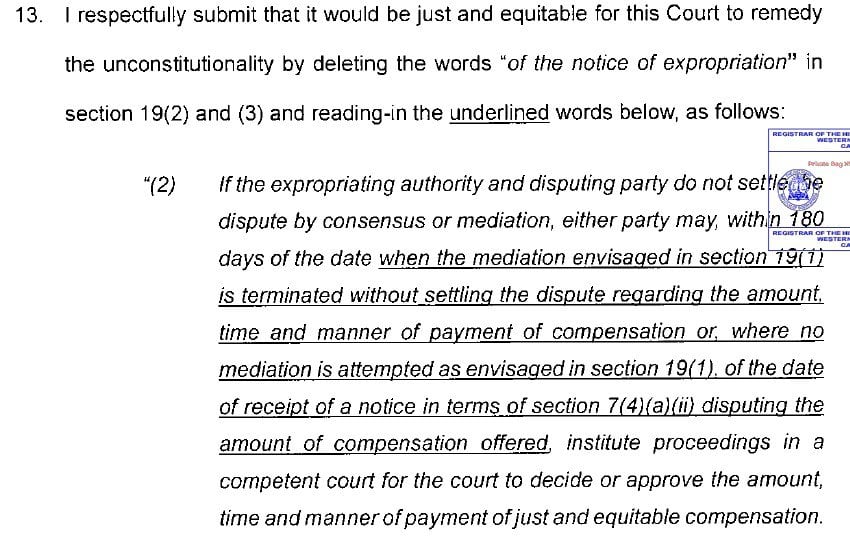AfriForum hve argued that the president's admission has exposed his 'blatant lies'.

President Cyril Ramaphosa has suggested alternate wording for a key section of the Expropriation Act after admitting a contradiction in terms.
The disputed clause relates to the terms of engagement between the state and private citizens looking to defend their property.
The Democratic Alliance (DA) launched an application with the Western Cape High Court in February to challenge certain sections of Act, notably Section 19.
AfriForum on Sunday released Ramaphosa’s responding affidavits; adamant that the Act should now be sent back to parliament to review.
Ramaphosa admits ‘vagueness’ in Expropriation Act
The president conceded in his affidavit that the wording of Section 19 of the Expropriation Act created “a circular process”.
Section 19 of the Act deals with mediation between the state and affected parties as well as determinations made by the courts.
Section19(2) currently states that when the state and a private property owner fail to agree on expropriation, either party has “180 days of the date of the notice of expropriation” to register a dispute.
The DA and AfriForum asserted that the notice of expropriation can only be issued after the mediation process, or risk the process being declared unconstitutional.
Ramaphosa accepted that, read with Section 7 of the Act regarding the intention to expropriate, the process would prove unworkable.
“I am advised that this may render the provisions void for vagueness,” read Ramaphosa’s affidavit
The president’s responding affidavit asked the high court to “remedy the unconstitutionality” by removing the term “notice of expropriation”.
Ramaphosa suggested the wording be replaced to allow for an expropriation dispute to be registered, after mediation was terminated or when a notice of intention to expropriate had been issued.

Above: An excerpt of Ramaphosa’s suggested wording change for the Expropriation Act. Picture: Supplied / AfriForum.
AfriForum feeling vindicated
While the president stated the court had the power to alter the wording, AfriForum CEO Kallie Kriel said the extensiveness of the changes was a matter for the national legislature.
“Ramaphosa’s admissions confirm that he and the ANC have been telling blatant lies by dismissing AfriForum’s concerns about the unconstitutionality of the Expropriation Act as the ‘spreading of disinformation’.
“The lies of Ramaphosa and all those who falsely accused AfriForum have now, in fact, been exposed by Ramaphosa himself,” explains Kriel.
Section 12 of the Act dealing with compensation was also questioned, with the president asserting that the constitution does not rule out the possibility of nil compensation.
“These provisions do not simply prescribe for when nil compensation will necessarily be just an equitable but require due regard to all relevant circumstance before such a determination can be made,” Ramaphosa’s affidavit reads.
Kriel dismissed this, warning that nothing short of an outright guarantee of property rights would suffice.
“Ramaphosa is well aware that the slightest doubt about a country’s commitment to property rights scares off investors and results in growing poverty, unemployment and hyperinflation,” Kriel concluded.
NOW READ: Expropriation Act: ‘Contradictory processes’ will prevent implementation, says Macpherson
Support Local Journalism
Add The Citizen as a Preferred Source on Google and follow us on Google News to see more of our trusted reporting in Google News and Top Stories.








